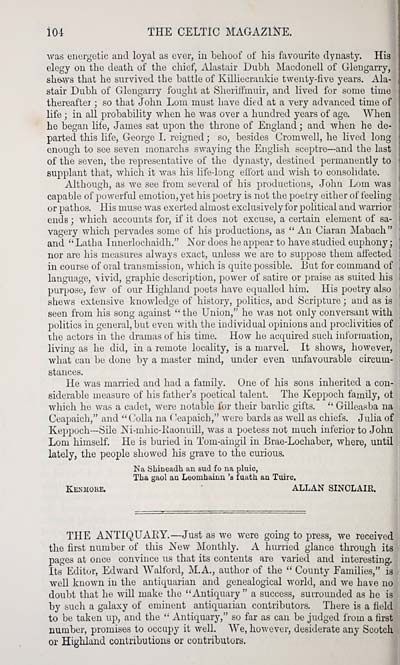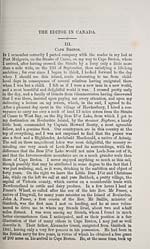Blair Collection > Celtic magazine > Volume 5
(114)
Download files
Complete book:
Individual page:
Thumbnail gallery: Grid view | List view

104 THE CELTIC MAGAZINE.
was energetic and loyal as ever, in behoof of his favourite dynasty. His
elegy on the death of the chief, ^Uastair Dubh Macdonell of Glengarry,
she-ws that he survived the battle of Killiecrankie twenty-five years. Ala-
stair Dubh of Glengarry fought at Slier iffmuir, and lived for some time
thereafter ; so that John Lorn must have died at a very advanced time of
life ; in all probability when he was over a hundred years of age. When
he began life, James sat upon the throne of England ; and when he de-
parted this life, George I. reigned ; so, besides Cromwell, he lived long
enough to see seven monarchs swaying the English sceptre—and the last
of the seven, the representative of the dynasty, destined permanently to
supplant that, which it was his life-long effort and wish to consolidate.
Although, as we see from several of his productions, John Lom was
capable of puwerfid emotion, yet his poetry is not the poetry either of feeling
or pathos. His muse was exerted almost exclusively for political and warrior
ends; which accounts for, if it does not excuse, a certain element of sa-
vagery which pervades some of his productions, as " An Ciaran Mabach"
and "Latha Innerlochaidh." J^for does he appear to have studied euphony;
nor are his measures always exact, unless we are to suppose them aifected
in course of oral transmission, which is quite possible. But for command of
language, \ivid, grai:)hic description, power of satire or praise as suited his
purpose, few of our Highland poets have equalled him. His poetry also
shews extensive knowledge of history, politics, and Scripture ; and as is
seen from his song against " the Union," he ^vas not only conversant with
politics in general, but even with the individual opinions and proclivities of
the actors in the dramas of his time. How he acquired such information,
living as he did, in a remote locality, is a marvel. It shows, however,
what can be done by a master mind, under even unfavourable circum-
stances.
He was married and had a family. One of his sons inherited a con-
siderable measure of his father's poetical talent. The Keppoch family, ot
which he was a cadet, were notable for their bardic gifts. " Gilleasba na :
Ceapaich," and "Colla na ( -eapaich," were bards as well as chiefs. Julia of
Keppoch— Sile Ni-mhic-Iiaouuill, was a poetess not much inferior to John
Lom himself. He is buried in Tom-aingU in Brae-Lochaber, where, until
lately, the people showed his grave to the curious. i
Na Shineadh an sud fo na pluic, 1
TLa gaol an Leomhaiun 'a f uath an Tuiro. '
Kenmobe. ALLAN SINCLAIR. ;
THE ANTIQUAEY. — Just as we were going to press, we received '.-
the first number of this New Monthly. A hurried glance through its V
pages at once convince us that its contents are varied and interesting. '
Its Editor, Edward Walford, M.A., author of the " County Families," is •;
well known in the antiquarian and genealogical world, and we have no ;■
doubt that he will make the "Antiquary " a success, surrouuded as he is ',
by such a galaxy of eminent antiquarian contributors. There is a field ^i
to be taken up, and the " Antiquary," so far as can be judged from a first i
number, promises to occupy it well. We, however, desiderate any Scotch J
or Highland contributions or contributors. g.
was energetic and loyal as ever, in behoof of his favourite dynasty. His
elegy on the death of the chief, ^Uastair Dubh Macdonell of Glengarry,
she-ws that he survived the battle of Killiecrankie twenty-five years. Ala-
stair Dubh of Glengarry fought at Slier iffmuir, and lived for some time
thereafter ; so that John Lorn must have died at a very advanced time of
life ; in all probability when he was over a hundred years of age. When
he began life, James sat upon the throne of England ; and when he de-
parted this life, George I. reigned ; so, besides Cromwell, he lived long
enough to see seven monarchs swaying the English sceptre—and the last
of the seven, the representative of the dynasty, destined permanently to
supplant that, which it was his life-long effort and wish to consolidate.
Although, as we see from several of his productions, John Lom was
capable of puwerfid emotion, yet his poetry is not the poetry either of feeling
or pathos. His muse was exerted almost exclusively for political and warrior
ends; which accounts for, if it does not excuse, a certain element of sa-
vagery which pervades some of his productions, as " An Ciaran Mabach"
and "Latha Innerlochaidh." J^for does he appear to have studied euphony;
nor are his measures always exact, unless we are to suppose them aifected
in course of oral transmission, which is quite possible. But for command of
language, \ivid, grai:)hic description, power of satire or praise as suited his
purpose, few of our Highland poets have equalled him. His poetry also
shews extensive knowledge of history, politics, and Scripture ; and as is
seen from his song against " the Union," he ^vas not only conversant with
politics in general, but even with the individual opinions and proclivities of
the actors in the dramas of his time. How he acquired such information,
living as he did, in a remote locality, is a marvel. It shows, however,
what can be done by a master mind, under even unfavourable circum-
stances.
He was married and had a family. One of his sons inherited a con-
siderable measure of his father's poetical talent. The Keppoch family, ot
which he was a cadet, were notable for their bardic gifts. " Gilleasba na :
Ceapaich," and "Colla na ( -eapaich," were bards as well as chiefs. Julia of
Keppoch— Sile Ni-mhic-Iiaouuill, was a poetess not much inferior to John
Lom himself. He is buried in Tom-aingU in Brae-Lochaber, where, until
lately, the people showed his grave to the curious. i
Na Shineadh an sud fo na pluic, 1
TLa gaol an Leomhaiun 'a f uath an Tuiro. '
Kenmobe. ALLAN SINCLAIR. ;
THE ANTIQUAEY. — Just as we were going to press, we received '.-
the first number of this New Monthly. A hurried glance through its V
pages at once convince us that its contents are varied and interesting. '
Its Editor, Edward Walford, M.A., author of the " County Families," is •;
well known in the antiquarian and genealogical world, and we have no ;■
doubt that he will make the "Antiquary " a success, surrouuded as he is ',
by such a galaxy of eminent antiquarian contributors. There is a field ^i
to be taken up, and the " Antiquary," so far as can be judged from a first i
number, promises to occupy it well. We, however, desiderate any Scotch J
or Highland contributions or contributors. g.
Set display mode to: Large image | Transcription
Images and transcriptions on this page, including medium image downloads, may be used under the Creative Commons Attribution 4.0 International Licence unless otherwise stated. ![]()
| Early Gaelic Book Collections > Blair Collection > Celtic magazine > Volume 5 > (114) |
|---|
| Permanent URL | https://digital.nls.uk/76450306 |
|---|
| Description | Volume V, 1880. |
|---|---|
| Shelfmark | Blair.6 |
| Attribution and copyright: |
|
| Description | A selection of books from a collection of more than 500 titles, mostly on religious and literary topics. Also includes some material dealing with other Celtic languages and societies. Collection created towards the end of the 19th century by Lady Evelyn Stewart Murray. |
|---|
| Description | Selected items from five 'Special and Named Printed Collections'. Includes books in Gaelic and other Celtic languages, works about the Gaels, their languages, literature, culture and history. |
|---|

